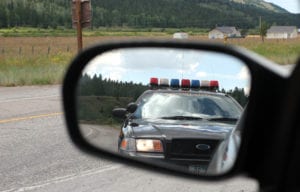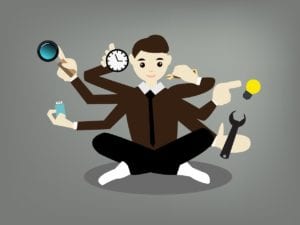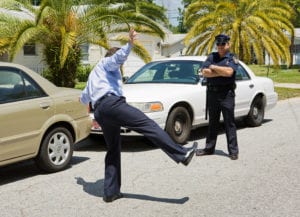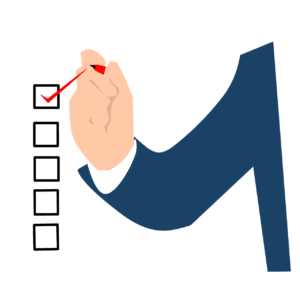 In a recent Mental Management of Emergencies program, we were talking about multitasking. During the discussion I explained what happens when a person attempts to multitask the act of paying of attention – which is neurologically impossible by the way. This turned the discussion to a sobriety test administered by police officers called the Divided Attention Test.
In a recent Mental Management of Emergencies program, we were talking about multitasking. During the discussion I explained what happens when a person attempts to multitask the act of paying of attention – which is neurologically impossible by the way. This turned the discussion to a sobriety test administered by police officers called the Divided Attention Test.
Multitasking explained
 Most people can perform multiple simultaneous tasks (i.e., drive your car while carrying on a conversation with the person sitting next to you). But are they multitasking? The answer is yes… and no. Or better yet… it depends.
Most people can perform multiple simultaneous tasks (i.e., drive your car while carrying on a conversation with the person sitting next to you). But are they multitasking? The answer is yes… and no. Or better yet… it depends.
If you are performing one or more tasks that do not require conscious thought, you are multitasking at the subconscious level of neural processing. The subconscious brain can multitask – quite well in fact.
If you are performing more than one task that requires conscious thought (i.e., active listening while sending a text to someone with explicit directions to a restaurant) you are not multitasking. What you are doing – while it may appear as multitasking – is actually single tasking in rapid succession.
Stated another way, the conscious brain cannot multitask the act of paying attention. This has been robustly proven with brain scans using functional magnetic resonance imaging (fMRI). Each time you shift attention between conscious tasks, it takes time and you are at risk of forgetting.
The Divided Attention Test

When a person is under the influence and, at the same time, under the direct observation of a law enforcement officer administering a field sobriety test the individual is very likely to be giving all their conscious attention to everything they are saying and doing. The act of simply standing upright without staggering becomes a formidable task that requires their full conscious attention.
Enter that devious “divided attention test.” The objective of the test is to get the intoxicated individual to shift conscious attention from one task (say, standing without staggering) to answering a series of questions or performing a series of small tasks. This shifts conscious attention away from awareness of standing without staggering.
The results are predictable (if the suspect is truly under the influence). As conscious attention is drawn away from standing upright without staggering, that task reverts back to subconscious programming. Under normal operating conditions (e.g., the non-intoxicated state) the subconscious brain can easily control the ability to stand upright without staggering. However, under the influence, the equilibrium mechanism is dulled and standing upright isn’t as “automatic” as when one is sober.
Rich Gasaway’s Advice
 The first, and most obvious piece of advice here is, don’t operate vehicles while under the influence and don’t be drunk in public.
The first, and most obvious piece of advice here is, don’t operate vehicles while under the influence and don’t be drunk in public.
Let’s relate this to emergency operations. When you are operating in an environment that is high stress, high consequence, time compressed and with rapidly changing conditions, it is very hard not to share attention among many competing visual and audible inputs. To give advice such as “don’t multitask” is simply unrealistic.
Rather, the best advice under these conditions is to simply be aware that you cannot multitask the act of paying attention. As you shift attention between tasks you are subject to forgetting information and becoming confused.
The more you train and practice, the more routine tasks can be shifted to automatically (subconsciously) performed tasks. Thus, you don’t have to pay attention to doing automatic tasks. Automatic performance of tasks can also present challenges, as well. So, for the challenges presented by multitasking, there is no perfect solution.
Go to the search box on the website and enter the keyword “multitasking” and you will see find several other articles on this important topic.
Action Items
 1. Discuss challenges you have faced when you have been forced to divide your attention between multiple tasks (hopefully not under the direct supervision of a law enforcement officer).
1. Discuss challenges you have faced when you have been forced to divide your attention between multiple tasks (hopefully not under the direct supervision of a law enforcement officer).
2. Discuss strategies for how to manage the potential for losing information while working in an environment that requires the shifting of attention (e.g., writing things down or creating visual prompts like the proverbial string tied to your finger).
3. Discuss some of the benefits and consequences for turning actions into automatic (subconsciously performed) tasks when you are operating in high stress, high consequence, time compressed environments. Hint: Tasks on autopilot can have bad outcomes too.
_____________________________________________________

If you are interested in taking your understanding of situational awareness and high-risk decision making to a higher level, check out the Situational Awareness Matters Online Academy.
CLICK HERE for details, enrollment options and pricing.
__________________________________
Share your comments on this article in the “Leave a Reply” box below. If you want to send me incident pictures, videos or have an idea you’d like me to research and write about, contact me. I really enjoy getting feedback and supportive messages from fellow first responders. It gives me the energy to work harder for you.
Thanks,

Email: Support@RichGasaway.com
Phone: 612-548-4424
SAMatters Online Academy
Facebook Fan Page: www.facebook.com/SAMatters
Twitter: @SAMatters
LinkedIn: Rich Gasaway
YouTube: SAMattersTV
iTunes: SAMatters Radio

If you are pulled over by law enforcement in a traffic stop situation the best advice for the individual is to simply and firmly refuse to submit to a Field Sobriety Test. There is no requirement that an individual must take the test.
That may be true. My advice would be to consult an attorney. I suspect if you do not submit to a field sobriety test you can still be arrested on the suspicious of driving while impaired. But this is WAY off topic to the article.
Can an individual get a divided attention test to test themselves on a normal basis without being intoxicated question mark